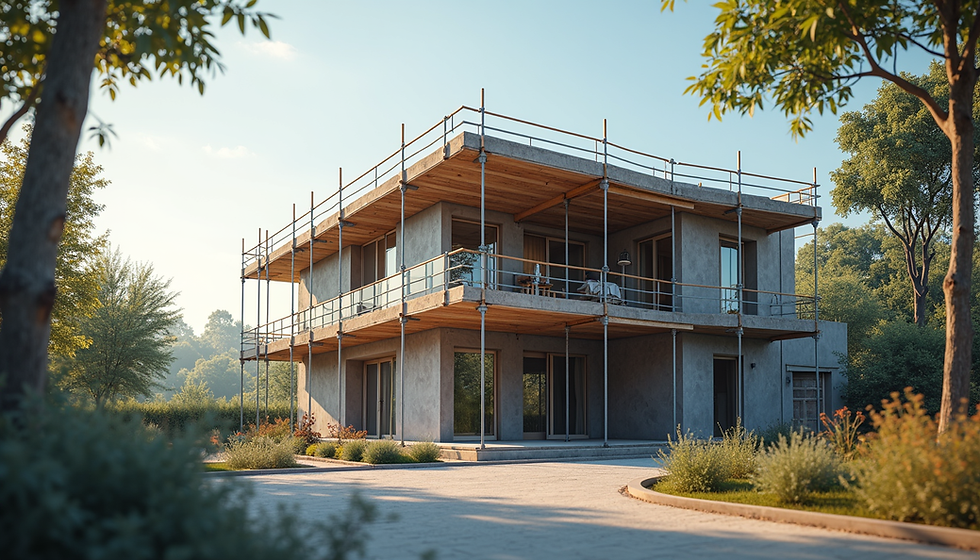7 Common Home Renovation Mistakes to Avoid: Expert Insights and Tips for a Smooth Remodeling Process
- northernhillsconst
- Nov 18, 2024
- 4 min read
Updated: Jan 5
Home renovations can completely transform your living space — adding comfort, functionality, and long‑term value. But without the right preparation, they can also become stressful, expensive, and full of unexpected setbacks. Many homeowners dive into renovations with excitement, only to discover hidden challenges that could have been avoided with better planning.
To help you navigate your renovation with confidence, we’ve outlined the seven most common home renovation mistakes — and how to avoid them. Whether you’re updating a bathroom, remodeling a kitchen, or tackling a full home makeover, these insights will help you stay on track and protect your investment.

1. Skipping the Planning Phase
One of the biggest mistakes homeowners make is jumping into a renovation without a clear plan. Renovations involve dozens of decisions — materials, layout, finishes, budget, timeline, and more. Without a roadmap, your project can quickly become chaotic.
Why Planning Matters
Prevents unexpected costs
Keeps design choices consistent
Helps avoid delays
Ensures contractors understand your vision
Reduces stress and confusion
How to Plan Effectively
Create a detailed checklist for each room
Outline your must‑have features
Set a realistic timeline
Use project management tools (Gantt charts, Trello, etc.)
Gather inspiration photos and samples
If you’re planning a major renovation, consider working with a professional who can help you map out the entire process. For more guidance, explore our Home Renovation Services.
2. Underestimating the Budget
Renovation costs add up quickly — especially when unexpected issues arise. Many homeowners start with an optimistic budget, only to discover hidden expenses like outdated wiring, water damage, or structural repairs.
How to Avoid Budget Surprises
Research average costs for your specific project
Get multiple estimates from reputable contractors
Include materials, labor, permits, and design fees
Add a 10–20% contingency fund for surprises
Example
A kitchen remodel might be estimated at $23,000, but unforeseen plumbing issues or material upgrades can easily push that number higher. Planning for these possibilities keeps your project moving without financial stress.
3. Ignoring the Home’s Structure
Cosmetic upgrades are exciting — but structural issues are where the real risks lie. Removing walls, relocating plumbing, or altering layouts without proper evaluation can lead to serious damage.
Structural Mistakes to Avoid
Removing load‑bearing walls without engineering
Ignoring foundation cracks
Overlooking roof or framing issues
Adding weight (tile, stone, appliances) without reinforcement
What to Do Instead
Before starting major renovations, hire a professional inspector or structural engineer to assess your home. This ensures your upgrades are safe, compliant, and built to last.
4. Neglecting Permits and Regulations
Skipping permits is one of the most common — and costly — renovation mistakes. Even small projects may require approval, depending on your local building codes.
Why Permits Matter
Ensures work meets safety standards
Protects you during resale
Prevents fines or forced demolition
Ensures electrical and plumbing work is up to code
Common Projects That Require Permits
Electrical upgrades
Plumbing changes
Structural modifications
Additions or conversions
HVAC installation
Always check with your local building department or consult your contractor before starting work.
5. Choosing the Wrong Contractor
Hiring the wrong contractor can turn a dream renovation into a nightmare. Low bids may seem appealing, but they often come with hidden costs, poor workmanship, or unreliable timelines.
How to Choose the Right Contractor
Read online reviews
Ask for references
Verify licensing and insurance
Review past projects
Compare detailed quotes
Ensure they’ve completed similar renovations
Pro Tip
Visit a contractor’s current job site if possible. Cleanliness, organization, and communication on‑site reveal a lot about their professionalism.
If you’re looking for a trusted, local contractor, explore our General Contracting Services.
6. Overlooking Lighting Choices
Lighting is one of the most underrated elements of home design. Even the most beautiful renovation can fall flat if the lighting is poor.
Why Lighting Matters
Enhances mood and comfort
Improves functionality
Highlights architectural features
Makes rooms feel larger (by up to 15%)
Types of Lighting to Include
Ambient: General room lighting
Task: Focused lighting for work areas
Accent: Decorative or highlight lighting
Examples
Under‑cabinet lighting in kitchens
Recessed lighting in living rooms
Pendant lights over islands
Skylights for natural illumination
Thoughtful lighting elevates your renovation from good to exceptional.

7. Rushing the Process
Renovations take time — often more than homeowners expect. Rushing leads to mistakes, poor craftsmanship, and costly rework.
Why Rushing Backfires
Materials may be installed incorrectly
Design decisions become rushed
Contractors may cut corners
Inspections may be missed
How to Stay Patient
Build flexibility into your timeline
Expect delays (weather, materials, inspections)
Make decisions early
Trust the process and your contractor
A well‑paced renovation produces better results and fewer headaches.
Final Thoughts
Home renovations are exciting opportunities to transform your living space — but they require careful planning, smart budgeting, and the right team. By avoiding these common mistakes, you’ll protect your investment and enjoy a smoother, more rewarding renovation experience.
Remember:
Plan thoroughly
Budget realistically
Respect your home’s structure
Follow local regulations
Choose the right contractor
Prioritize lighting
Take your time
With the right approach, your renovation will not only enhance your home’s value but also improve your daily life.
If you’re ready to start planning your renovation, Northern Hills Construction is here to help. Explore our Home Renovation Services or reach out for a consultation.



Comments